February was a busy reading month, with a huge range of genres, from historical fiction to magical realism to hard hitting truth disguised as fiction to a charming kids book by a talented First Nations author and artist, and everything in between.
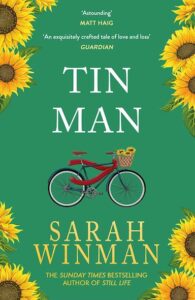 07 of 80 – Tin Man by Sarah Winman
07 of 80 – Tin Man by Sarah Winman
Sarah Winman’s third novel Tin Man is a beautifully written, sweet but sad story of love, loss, art and beauty, and the redemptive power of each. It opens with unhappy wife Dora winning a raffle and choosing a print of Vincent van Gogh’s Sunflowers over the bottle of Scotch her husband demands she choose. It’s her first act of defiance, and while time quickly jumps forward, as this is actually the story of her now-grown-up son Ellis, the painting, and Dora’s influence, is a thread that runs through the book. Ellis is torn between two loves, and two possible lives, one traditional, one wildly different, and the tension between the two. Wife Annie and best friend Michael. Head and heart. Tradition and outsider. I got this after loving Sarah Winman’s latest book Still Life, and while Tin Man is shorter and sadder, and I had no clue what it was about, I loved it for the beautiful writing, and the tenderness she imbues her stories with. And Sarah narrates it perfectly, capturing the love, friendship, freedom, regret, hope and heartbreak of all the characters. Soon, I will get to her earlier books A Year of Marvellous Ways and When God Was A Rabbit.
* * *
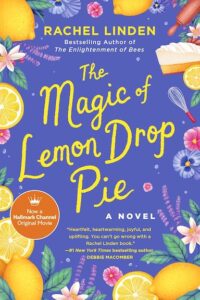 08 of 80 – The Magic of Lemon Drop Pie by Rachel Linden
08 of 80 – The Magic of Lemon Drop Pie by Rachel Linden
The Magic of Lemon Drop Pie by Rachel Linden is a sweet, magical read, full of love, family and sweet friendship, as well as sacrifice, regret and the death of dreams – and the possibility of second chances. When Lolly’s mum died, she gave up everything – her first and only love, her long-held career dream, travel plans – to run the family diner and look after her dad and her sister. After 10 years of it, she’s bitter but still being a martyr, although her resentment is getting harder and harder to live with. So on the eve of her thirty-third birthday, her great aunt gives her three lemon drops – and tells her that each one will allow her to live a single day of a life she could have had. Would she have been happy running her dream restaurant in England, so far from her family? If her mother had lived, what would that have changed? And if she’d refused to break off her engagement, would her love have lasted, or died its own slow death? Forced to face the cost of each decision, she starts to see her current life in a new way, and herself as well. An enchanting, uplifting story, with a few refreshingly unpredictable parts, some much needed personal growth for a few characters, and a lovely message about finding light in the darkness, even if it’s just a tiny spark. And the recipe for diner’s famous lemon drop pie is included too 🙂
* * *
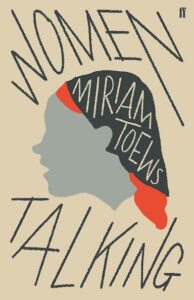 09 of 80 – Women Talking by Miriam Toews
09 of 80 – Women Talking by Miriam Toews
Between 2005 and 2009, more than 130 Mennonite women were repeatedly anaesthetised with a sedative spray meant for animals and raped in their homes by men they knew in their isolated community in Bolivia. For Canadian author Miriam Toews, who escaped her strict Mennonite community when she was 18, the real-life case horrified her but didn’t surprise her. She, like the Mennonites in Bolivia, is descended from the Molotschna colony in what is now Ukraine, and she understood how it could happen, and what the women endured, especially in the aftermath.
“I felt an obligation, a need, to write about these women – I’m related to them. I could easily have been one of them,” she said.
The case inspired her eighth book, Women Talking, which is sweet and tender, occasionally darkly humorous, and deeply disturbing. The hypocrisy and cruelty of the men, including their religious leader, is heartbreaking, and the fact that they demanded the women forgive their abusers or they wouldn’t get into heaven encapsulates everything awful about religion and patriarchy.
The women would wake up bloodied and aching, but when they spoke up, they were either told the devil had attacked them as punishment (for being subservient slaves to their husbands?) – or that nothing had happened, and their stories were lies, and “wild female imagination”. The blood, bruises and resulting children were apparently no proof they had been assaulted.
The title comes from the fact that in this community, women having a voice is subversive. Supporting each other is subversive. Not doing what their husbands or fathers tell them to is subversive. It’s a harrowing read, and I’m not sure I recommend it, but I’m glad I read/listened to it, and it is fascinating – a two-day Socratic dialogue on forgiveness, innocence and love – and I’ll definitely read more of her books. A movie of the book is out now, and has been nominated for many awards – I’m not sure if that would be more or less affecting and sad, although Miriam does concede her ending, for book and movie, is fictionalised and a little more hopeful than reality.
* * *
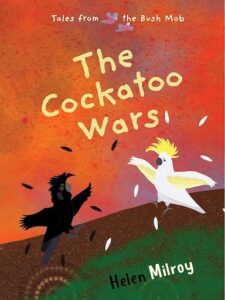 10 of 80 – The Cockatoo Wars by Helen Milroy
10 of 80 – The Cockatoo Wars by Helen Milroy
Tales from the Bush Mob is a series of adorable books about the Bush Mob, a group of animals who work together to solve problems. Each book shares a rich landscape of characters and places, and the stories, by Palyku author and artist Helen Milroy, emphasise the value of respect for First Nations culture and country, as well as the importance of courage, perseverance and wisdom to bind communities together.
I loved the first three Bush Mob books, and the new one, The Cockatoo Wars, is just as lovely – full of action and adventure, bright illustrations of our native animals, and a sweet story that highlights the importance of courage, perseverance and wisdom to bind communities together. Black Boss Cocky and White Boss Cocky have allowed their fierce arguments to consume them, so seriously that they have abandoned teaching their lore to the young birds or protecting the ancient forest they live in, and they have alienated all the other animals who used to live around them. When their fighting becomes so intense that the trees start to shake, two baby cockatoos fall from their nests – and since the stress has made their feathers fall out, their mummas – one black cockatoo, one white – don’t know which one is which. So they scoop them up and fly them to the other side of the forest and bring them up as brothers – which is lucky, because when a huge fire threatens their forest, the two Boss Cockies are yelling so loudly they don’t even notice, so it will be up to someone else to save the forest and their community. With important themes around working together, no matter our differences, it’s a gorgeous story of friendship, courage, and the important things in life.
* * *
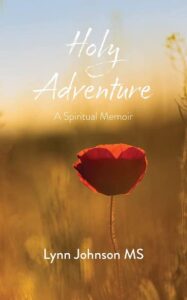 11 of 80 – 11 Holy Adventure by Lynn Johnson
11 of 80 – 11 Holy Adventure by Lynn Johnson
One of the joys of Facebook has been the beautiful people I’ve met from around the world, and one of my favourite is Lynn Johnson. We’ve watered each other’s faery gardens, sent letters and cards and gifts, chatted about politics, belief, goodness, kindness and the environment, and she is the sweetest soul, the most compassionate and caring person I know, my birthday twin – and now an author. Holy Adventure, her spiritual memoir, is a lovely collection of small stories of her spiritual encounters, the truths she learned from them, and the inspiring way she lives her beliefs and makes a difference in the world every day.
* * *
12 of 80 – The Witch’s Tale by Simon McDonald/The Black Thief and the Knight of the Glen
This month’s story for the Australian Fairy Tale Society is The Witch’s Tale by Simon McDonald, an Aussie version of an Irish tale (one of the variants is The Black Thief and the Knight of the Glen). It’s in a strange book, Great Australian Stories: Legends, Yarns and Tall Tales, which I must admit I haven’t read the rest of. But I did read lots of articles, essays etc about the story itself, which is the joy of the AFTS’s book club of sorts, where we get together to drink tea (Irish, on this occasion), eat (Irish) cake and chat about the story, its Australian perspectives and history, magic, cannibalism in faery tales (omg, it’s in so many!) and all the good things!
* * *
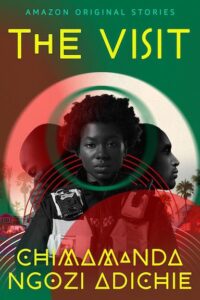 13 of 80 – The Visit by Chimamanda Ngozi Adichie
13 of 80 – The Visit by Chimamanda Ngozi Adichie
The short read The Visit, by Nigerian feminist author Chimamanda Ngozi Adichie, is a little unsettling, but fascinating and thought-provoking, and I look forward to reading some of her novels (when I get through a few more on my tbr-list and my book shelf!). In a world where roles are reversed and women hold all the power, it cleverly shows just how far we still have to go for equity, with nods to gendered healthcare, dealing with police, societal expectations and safety issues, amongst others. It’s clever, occasionally funny – with a little heartbreak in there too… The audiobook is narrated by Nyambi Nyambi, an American actor of Nigerian heritage, who I loved in The Good Fight, and I discovered later that The Visit is also in the speculative fiction anthology Black Stars, which looks really interesting too.


Get Social